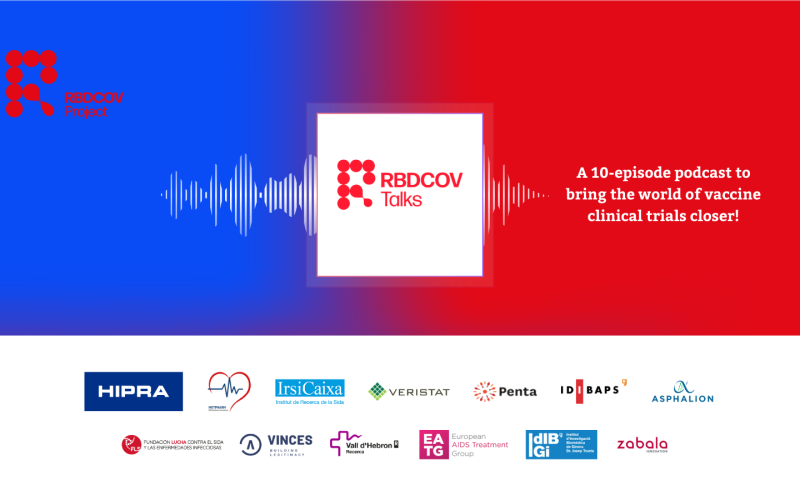
Almost two years in the making, the RBDCOV project, dedicated to the development of HIPRA's BIMERVAX® vaccine against COVID-19 and funded by the European Union under the Horizon Europe program, is exploring new dissemination channels through the production of its own podcast: "RBDCOV Talks". The aim of this audio format is to improve public knowledge about different areas of medical and scientific expertise, such as vaccine clinical trials, among others.
This initiative, which consists of ten episodes with the participation of clinical research teams, medical professionals, industry and other actors involved in the project, is part of the communication and dissemination strategy led by Zabala Innovation, which aims to facilitate access to technical knowledge to non-specialized groups. In addition, "RBDCOV Talks" informs the community about the current progress and results of the clinical trials being conducted to test the efficacy, tolerability and safety of HIPRA's recombinant BIMERVAX® vaccine.
A series of ten episodes to bring the vaccine clinical trial to the general public.
The production of this podcast has been possible thanks to the joint efforts of the members of the project consortium, including the Girona Biomedical Research Institute (IDIBGI), resulting in a series of ten episodes of about 10 minutes each. The podcast features researchers, scientists, clinicians and other health professionals and stakeholders from five different European countries who have actively participated in the different phases of the RBDCOV project.
The episodes cover a wide range of very interesting topics: from the most basic aspects of clinical research, such as what a vaccine clinical trial is and what it consists of, to more complex issues, such as inclusion criteria and immunological memory. Each episode of the podcast delves into relevant aspects of clinical vaccine research and provides a comprehensive yet accessible understanding of each and every one.
In the chapter entitled "What will the direct contribution of RBDCOV be if both clinical trials are proven to be effective" Dr. Antoni Castro, the principal investigator of RBDCOV at IDIBGI, participates. Dr. Castro is the head of the Internal Medicine research group and also head of the Internal Medicine service at the Josep Trueta Hospital.
The ten episodes of "RBDCOV Talks" will be available in English on the three main podcast distribution platforms: Spotify, Ivoox and Apple Podcasts.
The clinical trial with adolescents
On October 11, the RBDCOV project held a meeting at which the data and conclusions of the clinical trial with adults with immunodeficient diseases were presented. The results demonstrated the efficacy of the vaccine in this population group against the new COVID-19 variants. For now, the RBDCOV project is conducting its clinical trials in the younger population, recruiting adolescents between 12 and 18 years of age to participate in the trial for this age group.
About the RBDCOV project
The European RBDCOV project is coordinated by HIPRA and involves the Girona Biomedical Research Institute (IDIBGI). RBDCOV is one of 11 selected projects that support clinical trials of the new vaccine and may reach beyond Europe's borders by creating links with other European initiatives to address the fight against the coronavirus crisis and strengthen existing research infrastructures. The European Commission has selected 11 projects in total involving 312 research teams from 40 countries. These projects fall under the Horizon Europe Framework Program (2021-2027), Europe's largest research and innovation program, and one of its priorities is to support urgent research on coronavirus and its variants.

"Funded by the European Union. Views and opinions expressed are however those of the author(s) only and do not necessarily reflect those of the European Union. Neither the European Union nor granting authority can be held responsible for them.”